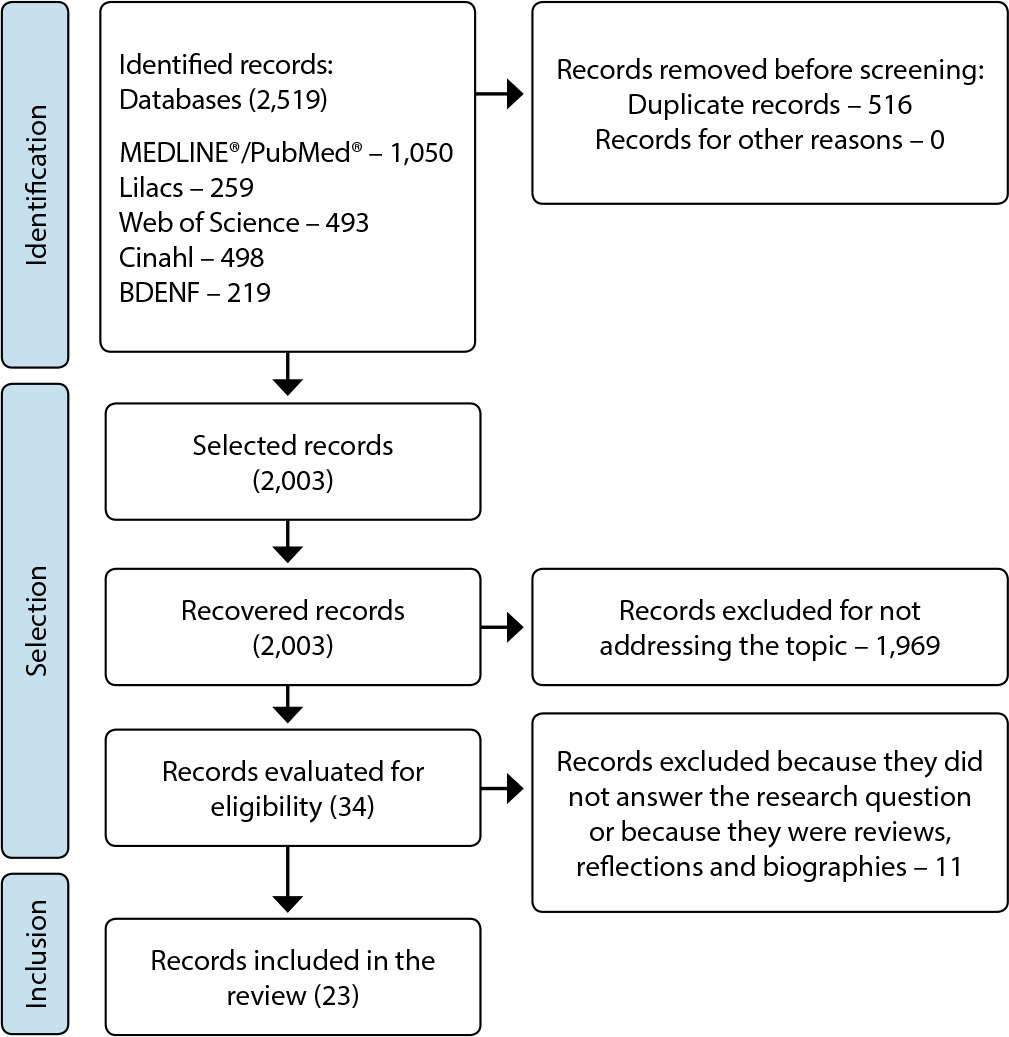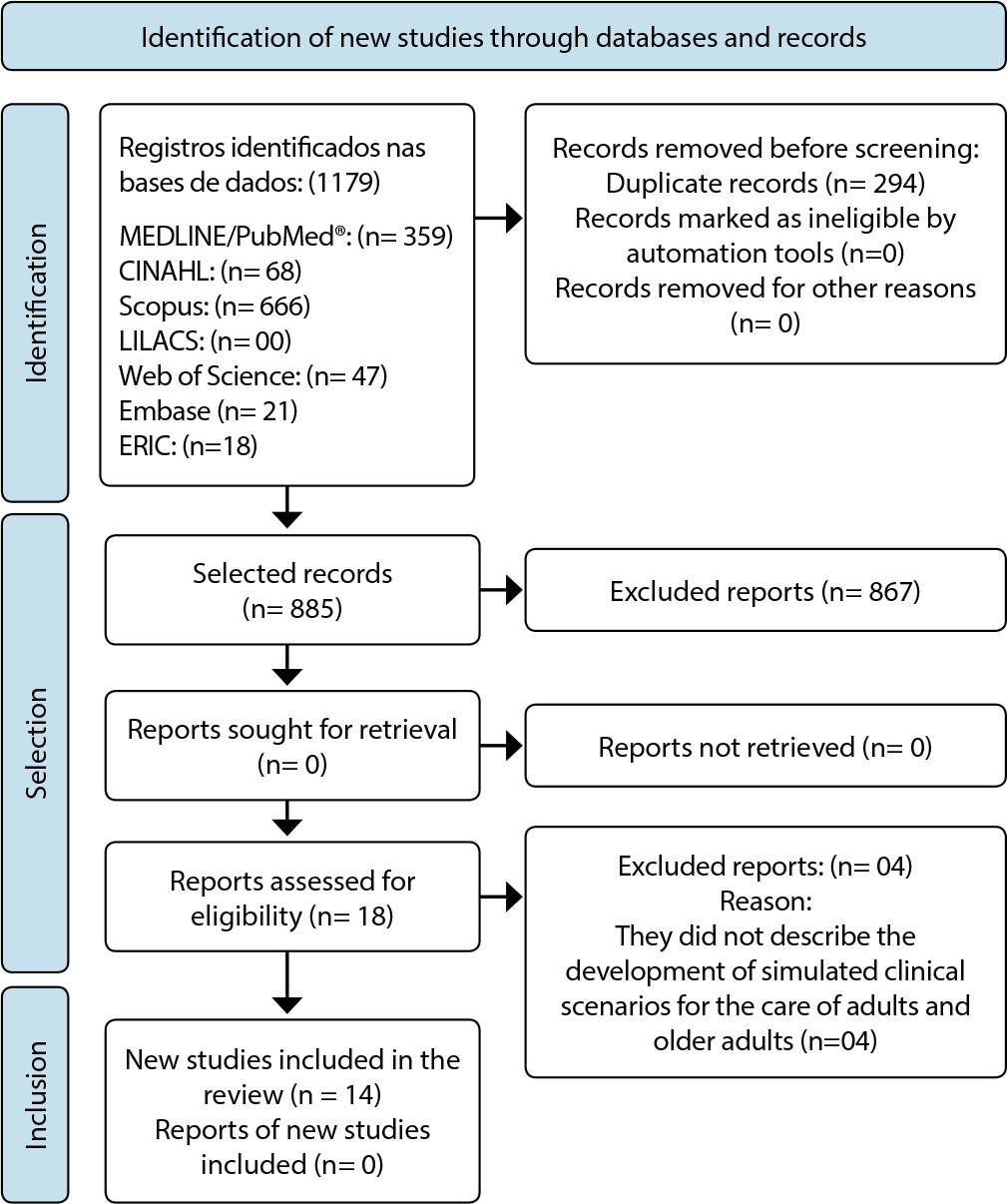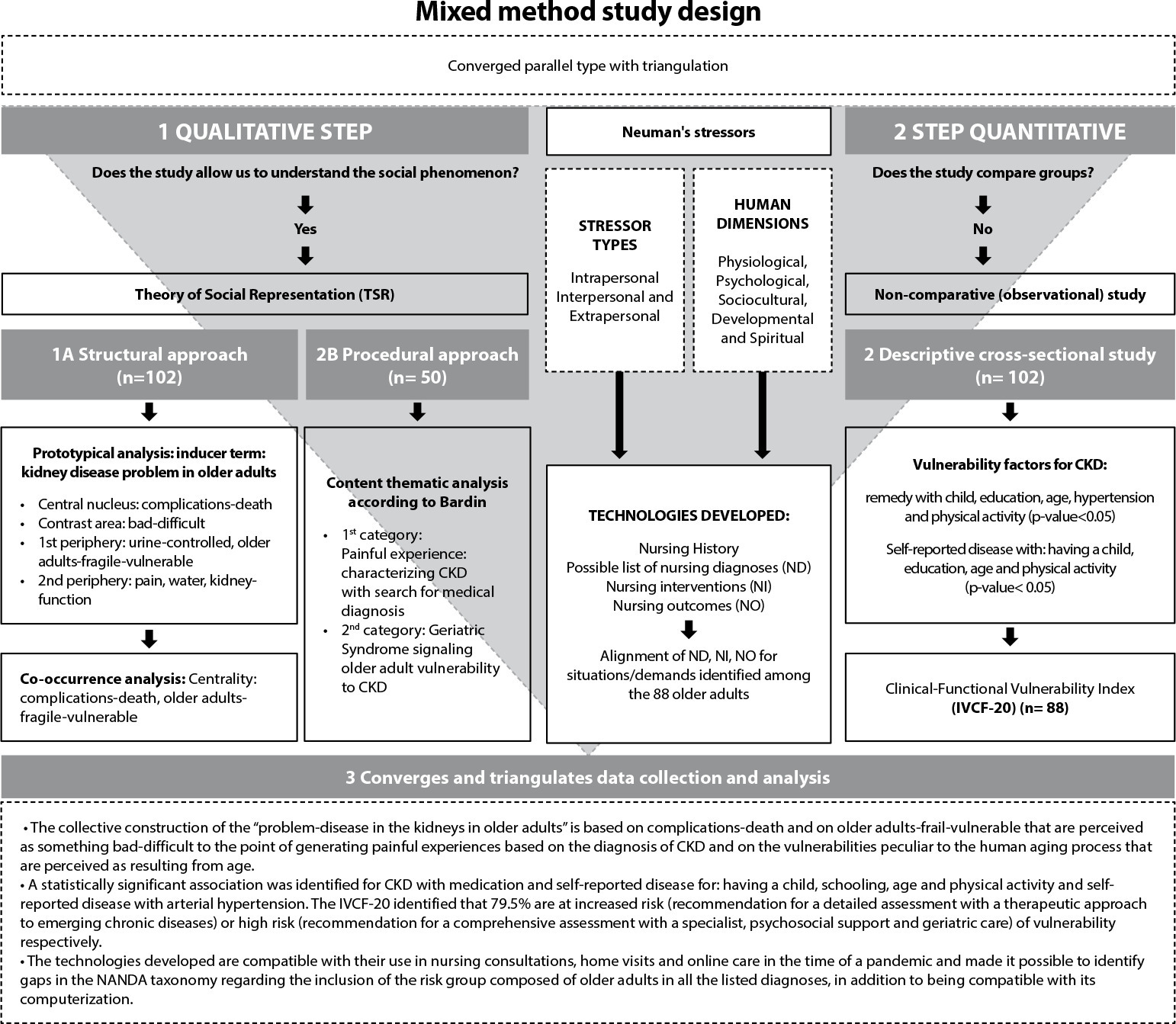-
ORIGINAL ARTICLE
Brazilian undergraduate nursing students’ critical thinking need to be increased: a cross-sectional study
Revista Brasileira de Enfermagem. 2023;76(1):e20220315
11-28-2023
Abstract
ORIGINAL ARTICLEBrazilian undergraduate nursing students’ critical thinking need to be increased: a cross-sectional study
Revista Brasileira de Enfermagem. 2023;76(1):e20220315
11-28-2023DOI 10.1590/0034-7167-2022-0315
Views0See moreABSTRACT
Objectives:
to map Brazilian undergraduate nursing students’ critical thinking level and investigate the correlation between selected sociodemographic data and critical thinking domains.
Methods:
in this descriptive cross-sectional study, participants’ (N=89) critical thinking was assessed using the Health Science Reasoning Test. Correlation between critical thinking domains and sociodemographic data was assessed using the Pearson correlation coefficient.
Results:
the overall results showed a moderate level of participants’ critical thinking (mean = 70.7; standard deviation 5.7). A poor performance was identified in 5 of the 8 critical thinking domains. A significant positive correlation was found between education period and critical thinking (p<.001).
Conclusions:
poor level in students critical thinking domains may lead to negative consequences for their learning outcomes. Further studies should be carried out to confirm our results, in addition to investigation of teaching methods that encourage and ensure the development of students’ critical thinking skills during nursing education.
-
REVIEW
Contributions of the institutions for the nursing professionalization: integrative review (2010-2020) in the light of freidsonian conceptions
Revista Brasileira de Enfermagem. 2023;76(1):e20220153
11-28-2023
Abstract
REVIEWContributions of the institutions for the nursing professionalization: integrative review (2010-2020) in the light of freidsonian conceptions
Revista Brasileira de Enfermagem. 2023;76(1):e20220153
11-28-2023DOI 10.1590/0034-7167-2022-0153
Views0See moreABSTRACT
Objective:
To analyze the contributions of the Brazilian Nursing Association and the Federal and Regional Nursing Councils in the literature for the professionalization of nursing in the light of Eliot Freidson’s theoretical conceptions.
Methods:
Integrative review of the literature, of socio-professional historical interest, carried out from June to November 2021, through the question: How did professional associations contribute to the professionalization of Brazilian nursing according to the literature from 2010 to 2020? The evidence were organized in a synoptic table, which allowed the construction of a conceptual map.
Results:
In the 23 selected studies, the professional associations presented scientific, social and political contributions, which shape the professional field of nursing, enabling knowledge/expertise, autonomy and self-regulation.
Final considerations:
The efforts of these institutions reaffirm nursing as an academic and consulting profession, capable of exerting control over the essence of nursing work. They strive to consolidate nursing as a legitimate professional field of health in Brazil.

-
EDITORIAL
The diagnosis and treatment of latent tuberculosis by nurses in Brazil: a necessary strategy
Revista Brasileira de Enfermagem. 2023;76(1):e760101
11-28-2023
Abstract
EDITORIALThe diagnosis and treatment of latent tuberculosis by nurses in Brazil: a necessary strategy
Revista Brasileira de Enfermagem. 2023;76(1):e760101
11-28-2023DOI 10.1590/0034-7167.2023760101
Views0Tuberculosis (TB) prevention, from preventing the progression of infection to active TB, is the main strategy to reduce its incidence and to reach the goals defined by the World Health Organization, according to the End TB strategy().Brazil, ranking 19th in terms of the number of cases, assumed its commitment to institute preventive treatment, especially among […]See more -
REVIEW
Simulated scenarios in nursing: an integrative literature review
Revista Brasileira de Enfermagem. 2023;76(1):e20220123
11-28-2023
Abstract
REVIEWSimulated scenarios in nursing: an integrative literature review
Revista Brasileira de Enfermagem. 2023;76(1):e20220123
11-28-2023DOI 10.1590/0034-7167-2022-0123
Views0See moreABSTRACT
Objectives:
to identify in scientific literature which simulated clinical scenarios were developed and validated for teaching and learning in nursing.
Methods:
integrative review, carried out in seven sources of information. The Rayyan program was used for selection, content analysis to explore the findings and the methodological assessment tool of the validity process, entitled Quality Appraisal tool for Validity Studies.
Results:
initially, 1,179 manuscripts were identified and 14 were part of the sample. Two categories were defined: Profile of simulated clinical scenarios produced in nursing; and Clinical skills developed and their assessment mechanisms.
Final Considerations:
there was a preponderance of high-fidelity scenarios, built in Brazil in the last five years, aimed at nursing students on the themes of emergency, maternal care and stomatherapy, addressing the assessment of cognitive, psychomotor and affective skills in nursing. Most studies obtained good methodological quality in their content validity process.

-
ORIGINAL ARTICLE
Factors associated with psychopathological symptoms among nurses at a university hospital
Revista Brasileira de Enfermagem. 2023;76(1):e20220075
11-28-2023
Abstract
ORIGINAL ARTICLEFactors associated with psychopathological symptoms among nurses at a university hospital
Revista Brasileira de Enfermagem. 2023;76(1):e20220075
11-28-2023DOI 10.1590/0034-7167-2022-0075
Views0See moreABSTRACT
Objectives:
to analyze the factors associated with psychopathological symptoms among nurses at a university hospital.
Methods:
a cross-sectional study developed at a university hospital in Pernambuco, in which 90 nurses participated. A questionnaire with social and professional characteristics and the Symptom Assessment Scale were used.
Results:
an association was found between the variable changing profession and the presence of characteristic symptoms of psychoticism, somatization and anxiety among nurses.
Conclusions:
the emergence of psychopathological symptoms has influenced nurses’ desire to search for another profession. This evidence reinforces the need for greater investments in better working conditions and welcoming actions in the work environment, in order to provide a better quality of professional life and promote the health of these workers.
-
ORIGINAL ARTICLE
O pensamento crítico dos estudantes de graduação em enfermagem brasileiros precisa ser ampliado: estudo transversal
Revista Brasileira de Enfermagem. 2023;76(1):e20220315
11-28-2023
Abstract
ORIGINAL ARTICLEO pensamento crítico dos estudantes de graduação em enfermagem brasileiros precisa ser ampliado: estudo transversal
Revista Brasileira de Enfermagem. 2023;76(1):e20220315
11-28-2023DOI 10.1590/0034-7167-2022-0315
Views0RESUMEN
Objetivos:
mapear el nivel de pensamiento crítico de los estudiantes brasileños de pregrado en enfermería e investigar la correlación entre los datos sociodemográficos seleccionados y los dominios del pensamiento crítico.
Métodos:
en este estudio transversal descriptivo, el pensamiento crítico de los participantes (N=89) fue evaluada mediante el Health Science Reasoning Test. La correlación entre los dominios de pensamiento crítico y los datos sociodemográficos se evaluó mediante el coeficiente de correlación de Pearson.
Resultados:
los resultados generales mostraron un nivel moderado de pensamiento crítico de los participantes (media=70,7; desviación estándar 5,7). Se identificó un desempeño deficiente en 5 de los 8 dominios del pensamiento crítico. Se encontró una correlación positiva significativa entre educación y pensamiento crítico (p<0,001).
Conclusiones:
los bajos niveles de los dominios del pensamiento crítico en los estudiantes pueden tener consecuencias negativas para sus resultados de aprendizaje. Se deben realizar más estudios para confirmar nuestros resultados, además de la investigación de métodos de enseñanza que fomenten y aseguren el desarrollo de habilidades de pensamiento crítico de los estudiantes durante su formación en enfermería.
Keywords:Educação em EnfermagemEstudantes de EnfermagemEstudos TransversaisPensamento CríticoServiços de SaúdeSee more -
ORIGINAL ARTICLE
Nursing protocol in chronic kidney disease prevention in older adults in primary care
Revista Brasileira de Enfermagem. 2023;76(1):e20220052
11-28-2023
Abstract
ORIGINAL ARTICLENursing protocol in chronic kidney disease prevention in older adults in primary care
Revista Brasileira de Enfermagem. 2023;76(1):e20220052
11-28-2023DOI 10.1590/0034-7167-2022-0052
Views0See moreASBTRACT
Objectives:
to develop a protocol for Nursing Process operationalization in approaching older adults with vulnerability to chronic kidney disease in Primary Health Care, based on Neuman’s stressors.
Methods:
a methodological study, carried out in two stages: 1) synthesis of evidence using an inductive strategy (mixed method study) and 2) protocol development to support the nursing process operationalization with older adults enrolled in a Basic Health Unit, using a deductive strategy (Neuman’s stressor concepts, NANDA, NIC, and NOC taxonomies, Risner’s line of reasoning, and cross-mapping), described according to A Step-by-Step Guide to Developing Protocols.
Results:
102 older adults participated, and 17 diagnoses, 34 interventions and 26 nursing outcomes were identified.
Conclusions:
the protocol developed is a technology that makes it possible to operationalize the Nursing Process, based on Neuman’s stressors and on taxonomy, conceptual and care frameworks, guiding care and nursing records.

-
ORIGINAL ARTICLE
Handgrip strength in older adults and driving aptitude
Revista Brasileira de Enfermagem. 2023;76(1):e20210729
11-28-2023
Abstract
ORIGINAL ARTICLEHandgrip strength in older adults and driving aptitude
Revista Brasileira de Enfermagem. 2023;76(1):e20210729
11-28-2023DOI 10.1590/0034-7167-2021-0729
Views0See moreABSTRACT
Objective:
to analyze handgrip strength as a predictor of the inability to drive in older adults.
Method:
a cross-sectional study conducted in traffic clinics with 421 older adults in Curitiba-Paraná from January 2015 to December 2018. A sociodemographic and clinical questionnaire, handgrip strength test, and queries from the National Registry of Qualified Drivers form were applied.
Results:
Reduced handgrip strength was not a predictor of inaptitude for vehicular driving (p=0.649). The predictors of inaptitude were: low education (p=0.011), incomplete elementary education (p=0.027), and cognition (p=0.020).
Conclusion:
reduced handgrip strength was not shown to predict for loss of driving skills in older adults. Low education level and reduced cognition level are conditions that were shown to be predictors for loss of vehicular driving license.
-
ORIGINAL ARTICLE
Mental health of nursing in coping with COVID-19 at a regional university hospital
Revista Brasileira de Enfermagem. 2020;73:e20200434
07-13-2020
Abstract
ORIGINAL ARTICLEMental health of nursing in coping with COVID-19 at a regional university hospital
Revista Brasileira de Enfermagem. 2020;73:e20200434
07-13-2020DOI 10.1590/0034-7167-2020-0434
Views0See moreABSTRACT
Objective:
to identify prevalence and factors associated with anxiety and depression in nursing professionals who work to cope with COVID-19 at a university hospital.
Methods:
a cross-sectional observational study using a sociodemographic questionnaire and Hospital Anxiety and Depression Scale, with 88 nursing professionals. Data were analyzed using absolute and relative frequency and Statistical Package for the Social Sciences.
Results:
there was prevalence of anxiety (48.9%) and depression (25%). The majority of the sample consisted of women over 40 years old, married or in a common-law marriage, white, with higher education or graduate degree, with an income above 3,000.00 reais, public servants, working 40 hours a week and working in the hospital from 1 to 5 years.
Conclusion:
we must consider the impact on mental health nursing caused by COVID-19 and intervene with coping strategies to minimize the suffering of professionals.
-
REFLECTION
Thematic content analysis using ATLAS.ti software: Potentialities for researchs in health
Revista Brasileira de Enfermagem. 2020;73(3):e20190250
04-22-2020
Abstract
REFLECTIONThematic content analysis using ATLAS.ti software: Potentialities for researchs in health
Revista Brasileira de Enfermagem. 2020;73(3):e20190250
04-22-2020DOI 10.1590/0034-7167-2019-0250
Views0See moreABSTRACT
Objective:
to describe the most important tools of ATLAS.ti Software and to associate them with the procedures of Thematic Content Analysis.
Method:
It is a theoretical reflection of the Content Analysis phases of Laurence Bardin, associating them with software tools Atlas.ti and showing its usefulness for data analysis in qualitative research.
Results:
historical contextualization and the available resources of Atlas.ti software with presentation of health research involving the phases of thematic content analysis.
Final considerations:
The Atlas.ti software assists in the accomplishment of the thematic content analysis being this promising association in health research.

-
REFLECTION
Nursing education: challenges and perspectives in times of the COVID-19 pandemic
Revista Brasileira de Enfermagem. 2020;73:e20200683
10-26-2020
Abstract
REFLECTIONNursing education: challenges and perspectives in times of the COVID-19 pandemic
Revista Brasileira de Enfermagem. 2020;73:e20200683
10-26-2020DOI 10.1590/0034-7167-2020-0683
Views0See moreABSTRACT
Objective:
To discuss the challenges and perspectives of nursing education in times of the COVID-19 pandemic.
Methods:
Reflection study, with theoretical approach based on national and international publications, allied to the experience of researchers in the area of nursing education.
Results:
Four sections are identified: Nursing education: current affairs and perspectives; Education and technologies in time of pandemic: acceleration, alteration and paralysis; Difference between emergency, intentional and remote teaching; the return to the “new normality”: new structuring axes and legal norms.
Final considerations:
The conclusion is that longstanding challenges have emerged with the pandemic, and the processes of acceleration, change and paralysis have marked education in these times. Moreover, epidemiological, technological and psychological aspects should be more valued in the return to activities.
-
ORIGINAL ARTICLE
Validation of a booklet on self-care with the diabetic foot
Revista Brasileira de Enfermagem. 2019;72(3):780-787
06-27-2019
Abstract
ORIGINAL ARTICLEValidation of a booklet on self-care with the diabetic foot
Revista Brasileira de Enfermagem. 2019;72(3):780-787
06-27-2019DOI 10.1590/0034-7167-2017-0900
Views0ABSTRACT
Objective:
to describe the validation of the booklet on self-care with the feet of people with diabetes.
Method:
methodological study, focusing on the validation of a printed booklet. The content and appearance of the booklet was validated by 23 judges divided into three groups: 11 content and appearance, seven technicians and five of the area of design and marketing. The appearance was validated by 30 people with type 2 Diabetes Mellitus.
Results:
the judges in the nursing area allowed the validation of material with a Content Validity Index (CVI) of 0.99, judges in the area of design and marketing with Suitability Assessment of Materials (SAM) of 99.2% and the target audience with concordance index of 99.4%.
Conclusion:
the educational booklet proved to be valid and reliable educational material to be used in order to promote compliance with self-care with the feet of people with Diabetes Mellitus.
Keywords:Diabetes Mellitus Type 2Diabetic FootEducational TechnologyTeaching MaterialsValidation StudiesSee more
-
ORIGINAL ARTICLE
Braden Scale in pressure ulcer risk assessment
Revista Brasileira de Enfermagem. 2020;73(6):e20190413
08-10-2020
Abstract
ORIGINAL ARTICLEBraden Scale in pressure ulcer risk assessment
Revista Brasileira de Enfermagem. 2020;73(6):e20190413
08-10-2020DOI 10.1590/0034-7167-2019-0413
Views0See moreABSTRACT
Objective:
To analyze the applicability of the Braden Scale to individuals admitted to an Intensive Care Unit (ICU) with the nursing diagnosis Impaired Physical Mobility, in its prediction potential to develop pressure ulcer (PU).
Methods:
A cross-sectional, quantitative study that evaluated all patients hospitalized in an ICU between November 2016 and February 2017, with the Braden Scale.
Results:
The prevalence of PU was 35.8% (24/67), in male individuals 58.3% (14/24), diagnosed with ischemic CVA 51.9% (12/27), and with hemorrhagic CVA 7.4% (2/27). Among patients classified at severe risk of developing pressure ulcer, 83.3% (20/53) developed it, and 76.7% (33/53) did not develop it.
Conclusion:
The performance of the Braden Scale showed a balance between sensitivity and specificity, confirming it as a better predictive risk assessment instrument in this group of patients.
-
ORIGINAL ARTICLE
Prevalence of symptoms and quality of life of cancer patients
Revista Brasileira de Enfermagem. 2020;73(2):e20180287
02-27-2020
Abstract
ORIGINAL ARTICLEPrevalence of symptoms and quality of life of cancer patients
Revista Brasileira de Enfermagem. 2020;73(2):e20180287
02-27-2020DOI 10.1590/0034-7167-2018-0287
Views0See moreABSTRACT
Objectives:
to analyze the prevalence of symptoms and their relationship with the quality of life of cancer patients.
Methods:
this is a cross-sectional study with 107 patients evaluated using a sociodemographic instrument, the hospital anxiety and depression scale (HADS) and the quality of life scale (EORTC-QLQ-C30). Pearson’s correlation test was used to evaluate the relationship between symptoms and quality of life.
Results:
prevalence of female patients (56.1%), 55 years as the mean age and 10 years of schooling. Fatigue (76.6%), insomnia (47.7%), pain (42.1%), loss of appetite (37.4%), anxiety (31.8%) and depression (21.5%) were identified. Anxiety and depression symptoms presented a negative correlation with quality of life and positive correlation with physical symptoms.
Conclusions:
fatigue, insomnia, pain and loss of appetite were the most common and most intense symptoms. Anxiety and depression symptoms presented a negative correlation with quality of life and positive correlation with physical symptoms.
-
REVIEW
Strategies of active learning methodologies in nursing education: an integrative literature review
Revista Brasileira de Enfermagem. 2021;74(1):e20200130
03-24-2021
Abstract
REVIEWStrategies of active learning methodologies in nursing education: an integrative literature review
Revista Brasileira de Enfermagem. 2021;74(1):e20200130
03-24-2021DOI 10.1590/0034-7167-2020-0130
Views0See moreABSTRACT
Objectives:
to analyze the scientific evidence on the strategies of active learning methodologies used in the training of nurses, as well as their contributions and obstacles in training.
Methods:
integrative literature review conducted with 33 selected articles in the Medical Literature Analysis and Retrieval System Online, Latin American and Caribbean Literature in Health Sciences, Nursing Database, Scopus, Web of Science and Education Resources Information Center databases.
Results:
among the strategies, simulation, problem-based learning and flipped classroom were highlighted. The active search, the integration of theory and practice and group work were examples of contributions to the training of nurses. However, the lack of preparation of the actors and the lack of structural support contribute to the dissatisfaction of the students.
Final Considerations:
the active learning methodology places the student at the heart of the learning process, favors critical thinking and the ability to make decisions.
Search
Search in:
Nuvem de Tags
Aged (144) Atenção Primária à Saúde (239) COVID-19 (104) Cuidados de Enfermagem (269) Educação em Enfermagem (151) Educação em Saúde (139) Enfermagem (930) Estudos de Validação (131) Health Education (144) Idoso (208) Mental Health (149) Nursing (987) Nursing Care (306) Patient Safety (151) Primary Health Care (284) Qualidade de Vida (104) Quality of Life (106) Saúde Mental (145) Segurança do Paciente (150) Validation Studies (108)



